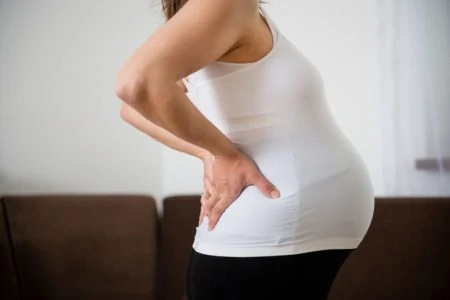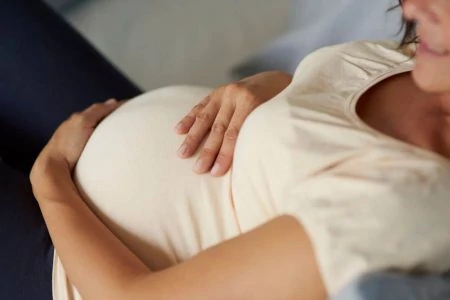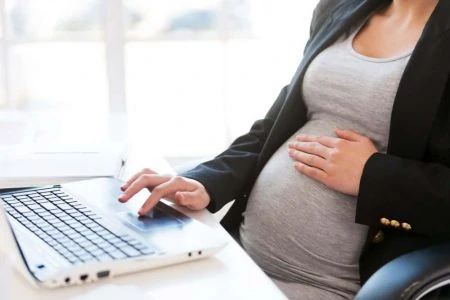Are you pregnant and experiencing back pain?
Back pain can be debilitating, especially during pregnancy when your treatment and medical options are limited. The pain tends to get worse as pregnancy progresses and as the baby grows.
Having experienced this pain ourselves, we made it our goal to find the best ways to relieve it, so you won’t have to suffer throughout your pregnancy.
This guide will answer all your questions about back pain during pregnancy, and we’ve included 13 back-pain-relief methods that are safe to use when pregnant. We also have suggestions for helping prevent back pain so you can skip the suffering and fully enjoy your pregnancy.
Key Takeaways
- Back pain is common during pregnancy, affecting 50 to 70% of pregnant women.
- Causes of back pain during pregnancy include weight gain, weakened abdominal muscles, loose joints, poor posture, and baby positioning.
- Preventing back pain during pregnancy involves choosing sensible footwear, exercising regularly, and strengthening back and abdominal muscles.
- If back pain occurs, it’s important to consult with a healthcare provider and follow recommended guidelines for relief and prevention.
- How Common is Back Pain During Pregnancy?
- When Does Pregnancy-Related Back Pain Occur?
- What Causes Back Pain During Pregnancy?
- Risk Factors for Back Pain During Pregnancy
- Pregnancy Back Pain Symptoms
- Does Back Pain Feel Different from Back Labor?
- How to Prevent Back Pain During Pregnancy
- 13 Tips to Relieve Your Achy Back
- FAQs
How Common is Back Pain During Pregnancy?
Back pain is incredibly common during pregnancy. It affects more than two-thirds of pregnant women (1) and is experienced in varying degrees of severity by most expectant women.
Though most women experience some general discomfort during pregnancy, 50 to 70 percent of women specifically report struggling with back pain during pregnancy.
When Does Pregnancy-Related Back Pain Occur?
While most people associate back pain with the end of pregnancy, thanks to the bulging belly and extra weight, it can occur at any point — even before you’ve gained a pound.
Back pain occurring before pregnancy is not pregnancy-related back pain. If a woman already has back pain before pregnancy, her chance of having pregnancy-related back pain is higher.
Editor's Note:
Dr. Njoud Jweihan, MDHere’s what you can expect at different points in your pregnancy:
First Trimester Back Pain
Early in your pregnancy, your uterus is just gearing up. Changing levels of hormones, specifically increasing levels of the hormone progesterone — the hormone that maintains the pregnancy, cause pelvic ligaments to loosen. Your muscles may adjust to this loosening, leading to instability of your joints, which may cause back pain.
Cramping during early pregnancy is also a common occurrence that can often be associated with lower back pain. Although pregnancy is known as a happy event, stress levels can increase during this time and present as physical symptoms such as fatigue, anxiety, and muscle pain — especially in the back.
Second Trimester Back Pain
Second-trimester back pain typically occurs during the latter half of this trimester, after 20 weeks. This can be confusing because mothers come in different shapes and sizes.
By 20 weeks, you’ve likely gained enough weight that it’s starting to put stress on your body, resulting in back pain. Some patients experience weight-gain-related pain even before 20 weeks.
Third Trimester Back Pain
Your lower back pain is likely to be the worst during your third trimester. Your belly is heavier, putting considerably more stress on your back, and your center of gravity shifts to the front of your body as your baby grows. You may find yourself leaning backward for relief. However, by continuing to lean backward, you add strain to your lower back. Your body is preparing for labor and your joints are loosening, resulting in subtle posture shifts that can have a significant effect.
You may also be more sedentary due to fatigue. As your baby gets larger and runs out of room to move in your womb, it will put direct pressure on your abdominal muscles that help stabilize your spine and support your back, depending on their positioning.
What Causes Back Pain During Pregnancy?
These are some of the many reasons for back pain during pregnancy:
1. Weight Gain
As your baby grows, you gain weight. Your body is not accustomed to supporting this added weight, resulting in lower back pain. 25-30 pounds is the ideal amount of weight gain during pregnancy. Gaining extra weight can increase back pain even further.
2. Weakened Abdominal Muscles
Your primary support comes from your core muscles, including your abdominal muscles, pelvic floor muscles, and back muscles. A weakening in one area of your core results in additional pressure and instability on the other parts of it.
As your belly grows, your abdominal muscles stretch and can even separate. This is a condition called diastasis recti. Some women will even see a small bulge in the abdominal region when this occurs (2).
3. Loose Joints
During pregnancy, your body prepares for labor by producing relaxin, a hormone known to prevent contractions in early pregnancy. Later in pregnancy, relaxin is the hormone responsible for softening the cervix and expanding the pelvic canal, getting your body ready for delivery. This helps loosen your pelvis, allowing it to open during labor for your baby to pass through. Unfortunately, relaxin also affects all the ligaments that stabilize the spine, causing them to become loose and resulting in subtle posture shifts and muscle strain.
This may be another cause of your lower back pain, particularly in the sacroiliac joints at the base of the spine.
4. Poor Posture
With the added weight on your frame along with a shift in your center of gravity, your posture is likely to change during pregnancy. You will find yourself tipping forward and trying to counter that by leaning backward. This results in back pain because poor posture puts a strain on ligaments that are unaccustomed to carrying the load.
5. Baby Positioning
Sometimes your baby may put direct pressure on your spine or a nerve, resulting in discomfort. For instance, you’ll have increased back pain if your baby is in the posterior position, specifically occiput posterior, when the baby is facing the mother’s abdomen and the baby’s head adds pressure to the mother’s sacrum.
6. Labor Pains
Some women experience contractions in their lower back. Contractions feel different for every woman, but most describe them as radiating pain or severe menstrual cramps. If you are having pain that builds up and then subsides at regular intervals, it could be contractions.
Although what is assumed to be contractions can be only practice contractions known as Braxton hicks, which tend to be sporadic. If this occurs before 37 weeks of pregnancy, contact your doctor immediately.
7. Kidney Problems
Kidney stones are relatively rare in pregnancy, but physiological changes in your body during this time can elevate your risk of developing them (3).
The same is true of kidney infections. While they don’t occur in every woman, pregnancy causes additional pressure on the bladder and urinary tract, increasing the risk of a urinary tract infection (UTI). Untreated UTIs can result in a kidney infection known as pyelonephritis, which tends to be more severe during pregnancy.
Both kidney stones and kidney infections can cause severe back pain in pregnant women.
Risk Factors for Back Pain During Pregnancy
Back pain is incredibly common, but some risk factors increase your chance of experiencing it (4).
These are some risk factors:
- Back pain prior to pregnancy.
- Back pain during a previous pregnancy.
- Weak abdominal muscles.
- Low flexibility.
- Sedentary lifestyle.
- Carrying multiples.
- Gaining more weight than recommended.
Pregnancy Back Pain Symptoms
Back pain during pregnancy feels different for every woman and also depends on the cause of her pain.
Back pain during pregnancy may feel like:
- A dull ache.
- Discomfort on one side or the other.
- Radiating pain.
- Pain in the center of the lower back.
- A deep ache in the buttocks.
- Pain that extends through the thighs and legs.
While sharp pains can undoubtedly happen during pregnancy, this type of pain is much less common. Sharp back pain that shoots down the legs can also be related to nerve pain or a more serious condition. It is best to consult your doctor or health care provider immediately if you are experiencing sharp pains.
Does Back Pain Feel Different from Back Labor?
It can be challenging to differentiate between pregnancy-related back pain and labor pains you feel in your back. However, there are a few ways to distinguish the two.
1. Back Pain is Constant
Back pain is typically constant and achy. While its severity might wax and wane, it doesn’t come and go predictably. Labor pains occur at regular intervals with a severe intensity that usually does not ease up.
2. Back Pain Can Be Relieved
Usually, you can find some way to relieve back pain — whether it’s by changing positions, putting your feet up, or having your partner rub your lower back. If you’re experiencing labor, these methods will not resolve your pain. Only the ending of the contraction will cause it to subside.
3. Back Pain Has a Trigger
While not always the case, you can often identify what you were doing earlier in the day that may have triggered back pain. You may have been on your feet for too long, slept poorly, or lifted something that resulted in a muscle tear. Labor pains tend to come on without a specific trigger, whereas back pain is a chronic condition.
4. Back Pain Is Not Accompanied By Abdominal Tightness
When you’re in labor, your uterus contracts. Though you may feel it in your back, the contractions wrap around from the front. If you are experiencing contractions and back labor, you may notice your belly tightening at regular intervals along with your back pain.
Regular back pain is not accompanied by abdominal tightness.
While these tips may help you distinguish between regular back pain and early labor signs, be advised that once labor progresses, if you experience true “back labor,” it may feel very different. During your period of hard labor — as opposed to early labor — back pain may not let up like regular contractions, and you may feel a constant pain if you are experiencing back labor (5).
Keep This Statistic In Mind
How to Prevent Back Pain During Pregnancy
Back pain is common during pregnancy, but that doesn’t mean there aren’t some things you can do to prevent it from occurring.
1. Choose Sensible Footwear
You’re not the first person to refuse to give up their heels during pregnancy, but believe me when I say that an ounce of prevention is worth a pound of cure. Even if you’re not currently experiencing back pain, swapping out your footwear can help you keep your back muscles happier than they would be in your stilettos.
2. Exercise Regularly
Exercise and stretching are some of the best things you can do for yourself while you’re pregnant. Exercise has numerous physical benefits, one of them being that it can help stave off back pain.
The good news is your exercise doesn’t even have to be vigorous to make a big difference. Even a 20-minute walk once a day can have huge benefits. Simply moving your body will help to strengthen your muscles and may allow you to keep back pain at bay.
Unless your doctor advises otherwise, continue your exercise routine through to your baby’s birth — modifying as necessary, of course. Muscles can atrophy quickly, and if you’re accustomed to working out regularly but then cease to do so in the final weeks, you may notice back pain appear that you’d previously managed to keep at bay.
3. Strengthen Your Back Muscles
Since your back is at risk, it makes sense to strengthen it. Starting early in your pregnancy, engage in light weightlifting exercises that can help to strengthen your lower back.
Some examples are:
- Deadlifts: Stand with your feet hip-width apart, knees slightly bent. Using light weights or even none at all, bend at your waist and allow your hands to hang toward the floor. Keep your core and pelvic floor tight, and maintain full control as you bend down and come back up. Deadlifts are also used by serious weightlifting competitors and are often done with heavy weights. If you are pregnant, remember to use light weights to avoid injury — it doesn’t take much to strengthen your lower back. You’re trying to avoid back pain — not win a weightlifting competition!
- Arm and leg lifts: Get on all fours on the floor. Slowly extend one leg back and then up, maintaining complete control the whole time. If you are able, lift the opposite arm and point it straight out. However, if you feel uncomfortable or cannot maintain your balance, omit the arms or do them separately.
4. Strengthen Your Abdominal Muscles
Sit-ups aren’t exactly a pregnancy-friendly exercise. Do the following exercises a few days a week to strengthen your abdominal muscles. Remember that only light weights are recommended, and you should never push yourself too hard during pregnancy.
Simply using and moving your muscles will help strengthen them sufficiently.
- Abdominal twists: Place your feet hip-width apart. Bend your knees so you are in a half-squat. Do not squat too deeply, and if you feel any discomfort, make your squat more shallow. Holding a light weight in each hand against your chest, twist at the waist from side to side. Do not wildly swing your body, but instead, maintain control and squeeze your abdominal muscles as you twist back and forth.
- Uppercuts: Standing again in a partial-squat position with light weights, make an uppercut punching motion while twisting slightly at the waist. Keep your abs tight. You can also do this exercise without weights.
- Knee lifts: Stand with your hands on your hips. Raise your knee in a slow and controlled motion, making sure you are lifting with your abdominals. If you can do so comfortably, crunch forward slightly as your knee comes up to work your abs harder. If you have trouble with balance, you can do this exercise while standing against a wall.
Remember to always consult with your doctor before attempting these exercises, and make sure you do not have any risk factors that could prevent you from performing these exercises.
Sometimes, no matter what you do to avoid it, you will still develop back pain during pregnancy. Remember that your body is under a great deal of stress by growing a baby, and it may be unavoidable. But if you do develop back pain, there are some things you can do to try to relieve it.
13 Tips to Relieve Your Achy Back
If you’re currently experiencing pregnancy-related back pain, here are some things you can do to try and relieve it.
- Incorporate light exercise: Use it or lose it, mama. If you haven’t been exercising but are starting to experience discomfort, you might be surprised by what a difference starting a light exercise and stretching routine can make. Don’t go crazy, but start doing things that are both relaxing and enjoyable to you, like walking or swimming.
- Choose supportive footwear: If you’re still wearing your pre-pregnancy shoes, your back pain might be signaling it’s time to stop. Opt for shoes with good arch support — and look for shoes that don’t tie, since soon your feet will be out of reach.
- Get a massage: A prenatal massage can do wonders for you — just make sure the practitioner you choose has been specially trained in pregnancy massage. And check with your insurance since this is often considered part of medical treatment during pregnancy. They might even cover the cost if you get a prescription from your obstetrician.
- Put your feet up: When you sit with your feet flat on the floor, it can pull at the muscles in your lower back. If you sit at work, bring a stool in to raise your feet slightly. If you’re lounging at home on the couch, just kick those puppies up and relax.
- Take a warm bath: There’s a reason why birthing tubs are popular in hospitals and birthing centers — because water can be a magical, all-natural pain reliever. Soaking in a tub is perfectly safe if you keep the water below 100 degrees.
- Alternate heat and cold: Just as if you had a sports injury, alternating heat and cold can help reduce inflammation in your muscles and then help them relax. Always start with a cold pack, then use a heating pad for no more than ten minutes at a time on medium or low heat. Never sleep with a heating pad or use one on your belly while pregnant. Always check the ingredients in the heating or cooling pads, and confirm if they are safe for pregnancy.
- Wear a maternity belt: A maternity belt helps support your belly and takes some of the pressure off your back. It can either be worn under your clothes or outside your outfit. They’re admittedly not the cutest invention, but they sure are effective!
- Improve your posture: It’s easy to start slouching while sitting or standing as your belly gets heavier. Try to be mindful of your posture, and correct it when it’s out of whack. This will take pressure off your lower back and help strengthen your core muscles.
- Use a pregnancy pillow: Put a pregnancy pillow between your knees to keep your thighs parallel while you sleep. If you don’t, your legs can pull down on your hips, causing lower back pain. The pregnancy pillow can also help position you correctly, keeping you off your back while you sleep.
- Use a tennis ball: No, you won’t be playing tennis — unless you want to. Have your partner press and roll a tennis ball into your lower back, where you feel the most intense discomfort. If you don’t have anyone available to assist you, hold the ball between your back and a wall, and press your back against the ball to relieve any tight spots.
- Lift safely: If you’ve constantly got back pain, you might need to make some lifestyle modifications to get through daily life. When you pick things up, squat rather than bend over. As you are standing from a squatting position, do not put pressure on your abdominal muscles. Instead, put your elbow and forearm on your knees, and use your arm strength to stand back up. This will help keep the pressure off your lower back.
- Visit a chiropractor: Chiropractic adjustments are safe during pregnancy when performed correctly. Speak with your doctor if you’re interested in visiting a chiropractor, and ask them for a referral so you know you’re seeing someone trustworthy and trained in pregnancy chiropractic.
I have worked with a good chiropractor who was skilled in chiropractic care during pregnancy, so I know how helpful this can be. They won’t do anything drastic but can straighten out the joints in your spine that, when slightly out of balance, can contribute to lower back pain in pregnancy.Editor's Note:
Dr. Njoud Jweihan, MD - Take medication: If these pain relief methods don’t work, acetaminophen — the medication in Tylenol — is the go-to pain reliever during pregnancy. Overuse, however, has been linked to liver damage, so try to use it sparingly. Always communicate with your doctor about the frequency and dosage they feel is appropriate during pregnancy. Make sure to avoid “muscle rub” products as they usually contain aspirin, which is not recommended for use during pregnancy.













